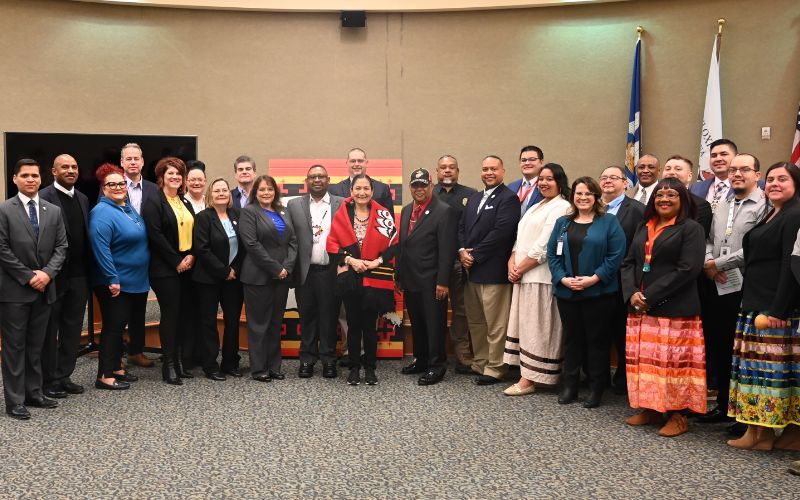
- Details
- By Native News Online Staff
During the visit, Chairman and CEO of the Tunica-Biloxi Tribe, Marshall Pierite hosted the Secretary on a tour through the reservation. Highlights of the tour included a visit to the Tunica Treasure Museum; a tour of the library where the Tribe’s partnership with Tulane University was on display through Tunica language immersion workshops; and a visit to key reservation departments like housing development, the Tribe’s police department, and a new organic farm site, Tahch’i Farm.
The tour included an area of the reservation that has been cleared to build 19 new permanent homes funded by a $6.4 million grant from the U.S. Department of Housing and Urban Development (HUD) grant.
Haaland also stopped at the Halimushali ancient burial mounds. The land is a site of important cultural significance, and its ownership was transferred back to the Tribe by the City of Marksville in 2022. The transfer was the byproduct of decades of work between the Tribe and multiple generations of state leadership, marking the first time the land had been in Tribal possession since the early 1800s. Work is currently underway to restore and improve the site. During Haaland’s visit, Chairman Pierite stressed the need for additional federal funding to help bolster the work currently underway.
Haaland spoke about the Biden-Harris Administration’s recent investments in Indian Country through the 2022 Inflation Reduction Act and the 2021 Infrastructure Investment and Jobs Act. The two laws are the largest-ever federal investment in Indian country.
“It was an honor to host Secretary Haaland and thank her in person for the historic investments the Biden Administration has made in Indian country that have benefitted Indian country and the communities in which we live,” Pierite said in a statement.“Tunica-Biloxi has been bringing opportunity to central Louisiana and with the additional resources we will continue to grow and thrive for years to come.”
More Stories Like This
Native News Weekly (August 25, 2024): D.C. BriefsUS Presidents in Their Own Words Concerning American Indians
Native News Weekly (January 18, 2026): D.C. Briefs
Federal Judge Orders ICE to Halt Use of Pepper Spray, Arrests of Peaceful Protesters in Twin Cities
Tunica-Biloxi Cultural Leader John D. Barbry Walks On
Help us defend tribal sovereignty.
At Native News Online, our mission is rooted in telling the stories that strengthen sovereignty and uplift Indigenous voices — not just at year’s end, but every single day.
Because of your generosity last year, we were able to keep our reporters on the ground in tribal communities, at national gatherings and in the halls of Congress — covering the issues that matter most to Indian Country: sovereignty, culture, education, health and economic opportunity.
That support sustained us through a tough year in 2025. Now, as we look to the year ahead, we need your help right now to ensure warrior journalism remains strong — reporting that defends tribal sovereignty, amplifies Native truth, and holds power accountable.
 The stakes couldn't be higher. Your support keeps Native voices heard, Native stories told and Native sovereignty defended.
The stakes couldn't be higher. Your support keeps Native voices heard, Native stories told and Native sovereignty defended.
Stand with Warrior Journalism today.
Levi Rickert (Potawatomi), Editor & Publisher


